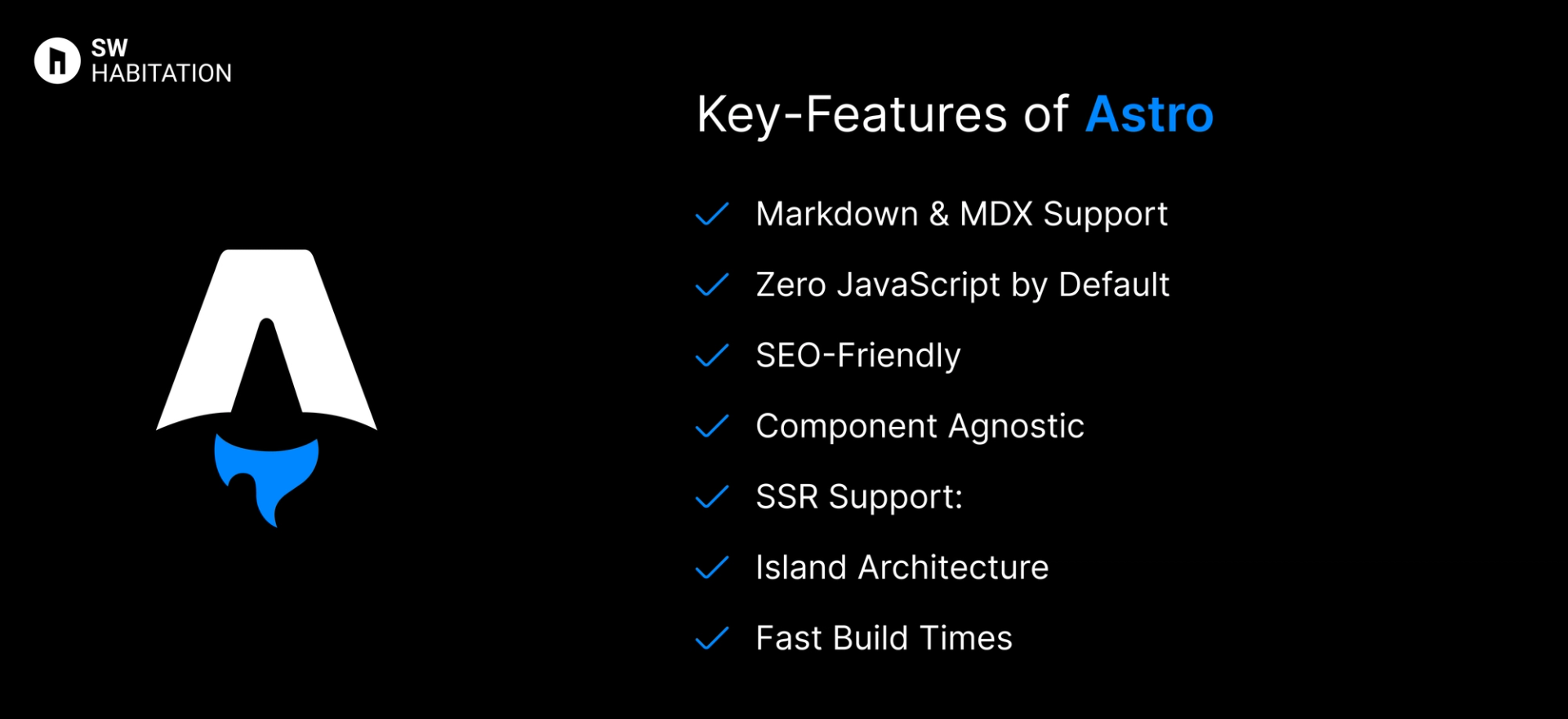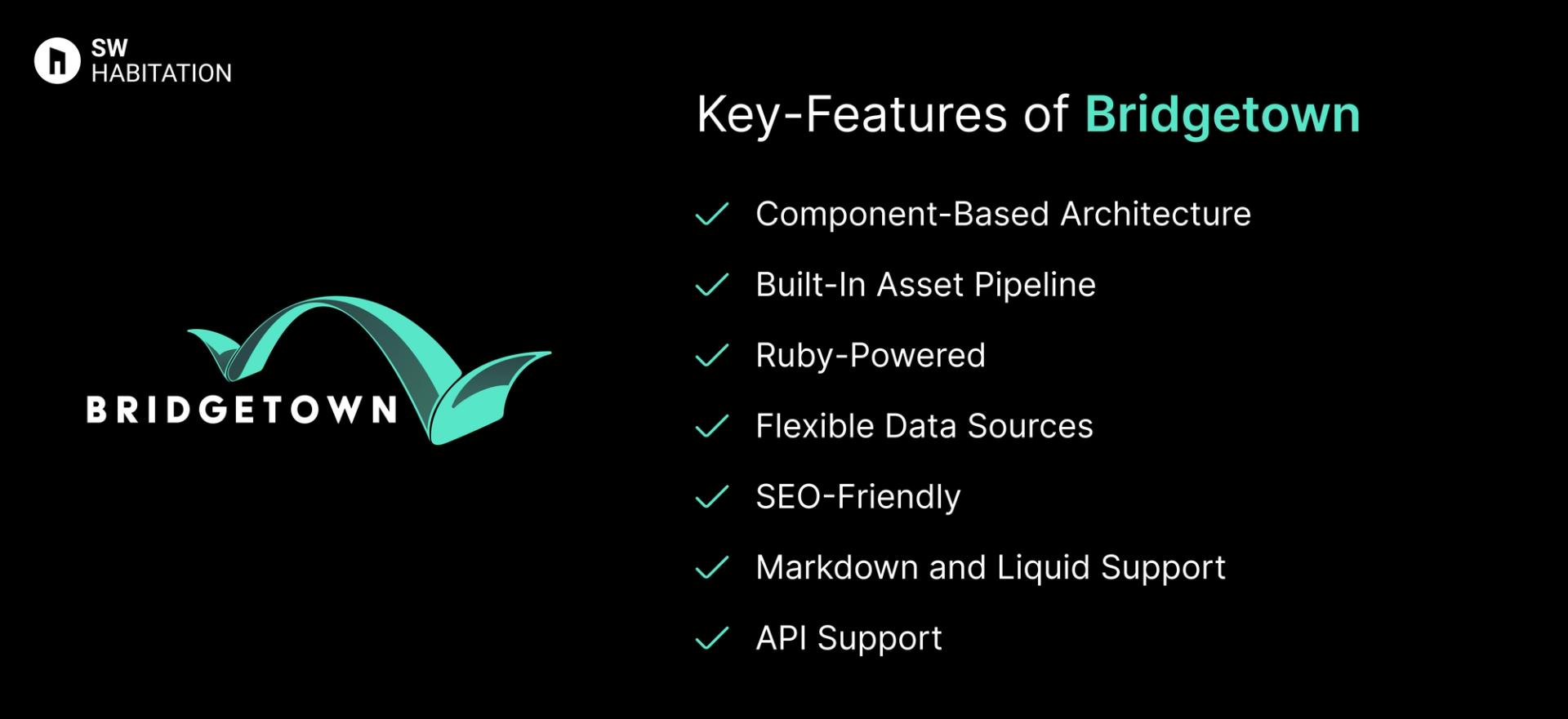Astro vs. Bridgetown

Astro

Bridgetown
Have you ever been to a website that loads super fast? Chances are it uses an SSG (Static Site Generator). It’s a tool that builds your site ahead of time, so when someone visits, they get the page instantly. No waiting around for things to load it’s just there.
What is Astro?
Astro is a modern Static Site Generator that focuses on delivering faster websites by sending as little javaScript as possible.
Unlike traditional javaScript frameworks, Astro renders pages at build time, creating static HTML that gets served directly to users.
One of its standout features is the island architecture, which lets you selectively hydrate only the parts of the page that need interactivity means you only load javaScript when it’s absolutely necessary.
Key Features of Astro


- Markdown & MDX Support: Write content with ease using Markdown or MDX.
- Zero JavaScript by Default: No javaScript is sends to the client unless absolutely needed.
- SEO-Friendly: Built-in optimisations like automatic sitemap generation.
- Component Agnostic: Supports React, Vue, Svelte, and more — all in the same project!
- SSR Support: Optional server-side rendering if needed.
- Island Architecture: Load JavaScript only for interactive components.
- Fast Build Times: Optimised for super-fast builds, even for large websites.
Advantages of Astro
- Great for Content-Driven Sites: Perfect for blogs, documentation, and portfolios.
- Developer-Friendly: Clean syntax and great tooling make development a breeze.
- Minimal Setup: Simple config with automatic optimisations.
- Flexible and Versatile: Use multiple frameworks in one project.
- Blazing Fast Performance: Less javaScript means faster load times.
Disadvantages of Astro
- Limited Dynamic Content: Out of the box, it’s more static-focused. Dynamic content needs extra handling.
- Newer Ecosystem: Fewer plugins and community resources compared to older SSGs.
- Learning Curve: Island architecture might take some time to get used to.
What is Bridgetown ?
Bridgetown is a static site generator built with Ruby.
It is designed to help developers create fast, modern websites with ease. It’s often seen as the spiritual successor to jekyll, with a fresh take on static site generation. Bridgetown combines the power of Ruby with a modern development workflow, supporting things like webpack, dynamic content with APIs, and flexible templating options.
Key Features of Bridgetown


- Component-Based Architecture: It supports reusable components for cleaner code.
- Built-In Asset Pipeline: It integrates with webpack for managing assets like CSS and JavaScript.
- Ruby-Powered: It leverages the simplicity and power of Ruby.
- Flexible Data Sources: It pull content from YAML, JSON, CSV, or external APIs.
- SEO-Friendly: It generates clean, semantic HTML with built-in SEO optimisations.
- Markdown and Liquid Support: It writes content in Markdown and use liquid for templating.
- API Support: It fetches dynamic content from APIs while keeping the site static.
Advantages of Bridgetown
- Extensible: Custom plugins and extensions for advanced use cases.
- Fast and Lightweight: Generates static HTML for quick load times.
- Great for Ruby Developers: Familiar tooling and language.
- Easy Content Management: Ideal for blogs and documentation sites.
- Powerful Templating: Supports Liquid, ERB, and other templating engines.
Disadvantages of Bridgetown
- Ruby Knowledge Required: Best suited for Ruby developers.
- Smaller Community: Compared to older SSGs like Jekyll, the community is still growing.
- More Setup: Requires setting up a Ruby environment, which may be unfamiliar to non-Ruby developers.
Comparison Between Astro vs Bridgetown
Use Cases of Astro
- SEO-Focused Projects: Ships with built-in SEO optimisations.
- Content-Heavy Sites: Blogs, marketing sites, and documentation hubs.
- Multi-Framework Projects: Mix and match React, Vue, and Svelte in one codebase.
- Developers Seeking Speed: Fast build times and minimal runtime JavaScript.
Use Cases of Bridgetown
- Content-Driven Sites: Great for blogs, documentation sites, and portfolios.
- Ruby Lovers: If Ruby is your jam, you’ll feel right at home.
- Small Projects with Big Potential: Clean structure and fast build times make it a good fit for smaller projects that may grow.
- Custom Workflows: Offers flexibility in handling assets and external data sources.
Conclusion
Static Site Generators are a big game changer if you’re looking to build a website that’s fast, secure, and easy to maintain. Whether you’re launching a personal blog, portfolio, or a business website, they give you the freedom to focus on what really matters, your content and your users without all the extra complexity.
The best part? You’re not locked into one way of doing things. You can choose the tools and tech you’re most comfortable with, and scale things up as your site grows. From lightning-fast load times to better SEO and easy hosting, SSGs make the whole process smoother.
At the end of the day, it comes down to what fits your workflow and goals best. Pick the one that feels right to your requirements, and you’ll be well on your way to creating a beautiful, high-performing website that you’re proud of 🙌
Frequently asked questions
Is Astro great for blogs and docs?
With support for Markdown and MDX, Astro is a fantastic choice for documentation sites, blogs, and other content-heavy websites
Does Astro support SSR?
Yes, You can use Server-Side Rendering (SSR) for dynamic content, or stick to static generation for blazing fast websites. Astro provides flexibility to choose the best approach.
Can I use React or Vue with Astro?
Yes, Astro supports React, Vue, Svelte, and many other frontend frameworks. You can even mix and match them on the same page.
Why is Astro so fast?
Astro uses HTML-first rendering, so it ships static HTML by default and only hydrates interactive components when necessary, leading to blazing fast performance.
Is Bridgetown actively maintained?
Yes, Bridgetown has an active community, and it’s regularly updated with new features and bug fixes. You’ll always have access to the latest updates.
Is Bridgetown content-friendly?
Yes, It works well with Markdown, custom components, and layouts, so you can easily create structured content.
Is Bridgetown only for Ruby devs?
Yes, Bridgetown is built for Ruby developers and works well with the Ruby on Rails ecosystem. If you’re familiar with Ruby, you’ll love its seamless integration.
Is Bridgetown a good Jekyll alternative?
Bridgetown is a modern alternative to Jekyll, with a more flexible architecture, faster build times, and improved plugin support.
